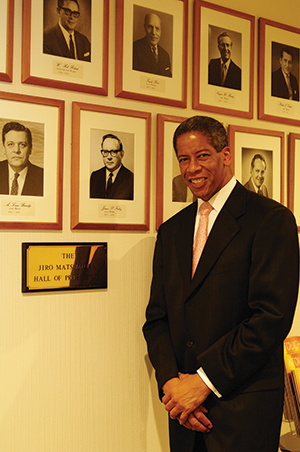 Gregariously holding court in the lobby of the famed Tokyo America Club, a posh private facility situated in the quiet confines of Tokyo’s Minato-ku, the organization’s newly-minted President enthusiastically greets club members and strangers alike in a manner that can only be described as uniquely American.
Gregariously holding court in the lobby of the famed Tokyo America Club, a posh private facility situated in the quiet confines of Tokyo’s Minato-ku, the organization’s newly-minted President enthusiastically greets club members and strangers alike in a manner that can only be described as uniquely American.
The broad smile, easy manner and genuinely engaged demeanor all belong to Lance E. Lee, a man who at first glance has the appearance of an always-on, seriously hard-nosed Western corporate executive, but upon further inspection reveals himself to be possibly the best cultural ambassador Americans could ever hope to have in Japan.
A Japanese membership staffer walks by with a business associate and, after happily introducing himself to the stranger, Lee hammers out a few details regarding the initiation of a new member (a subject that always seems to be on his mind), and then issues a friendly wave goodbye. Then, Assistant General Manager Bob Sexton happens by with a couple of associates and Lee deftly takes him to the side to discuss one of the many on-going club concerns, capping the exchange with a hearty laugh and a knowing wink. Later, a random member, just finishing a day of club activities with her children, watches as her child scrambles into the arms of Lee as if he were a long lost Uncle, and the two club members chat about the subjects common to all parents, the future of their children (Lee has five, all boys, with his Japanese wife, a medical doctor).
Finally, another staffer from one of the clubs’ high-end restaurants stops to share a new tip with Lee about the new iPod 3.0 software, a gadget that Lee, at 56 years-old, is probably more proficient with than your average 20-something New York hipster. These scenes all typify an average day for Lee at the Tokyo American Club, and it’s why he enjoys his new role so much. “I really enjoy the position,” said Lee. “I enjoy the feedback from the members and from the staff.”
Despite the ease with which Lee handles his myriad club responsibilities as President, the fact is that his personal journey is by no means easy to categorize. The stories of foreigners who have lived in and found success in Japan runs the gamut from the earliest modern travelers who came into Japanese society as military seafarers, to the post-WWII expats who witnessed the transformation of Japan into a less cloistered nation, to the current brand of Japan cool hunters turned acculturated local experts hoping to lift the veil that often fascinates the average Westerner.
But sometimes foreigners in Japan arrive at success through an extraordinarily circuitous route. Such is the case with Lance E. Lee. Raised on the rough and tumble streets of Los Angeles by his father, Lee’s life story defies the stereotype commonly associated with those from the inner cities of America.
Early on his father instilled within him a sense of responsibility, moral character, and a bootstrap work ethic that continues to define his work today. In fact, when discussing role models and mentors, Lee’s father is the first person he mentions. “The person that I really admire is my father, for his steadfastness and the fact that he had determination and a loyalty that I think all people would admire,” said Lee. “He had a decency about him that I really respected.”
Having completed a stint in the U.S. Air Force he found himself exploring the world of expat Japan by way of selling real estate investments to other foreigners for a Japan-based American company called Unival in 1974. This early experience led him to his very first lessons regarding the art of selling not only to foreigners, but to the notoriously vague and canny Japanese business person. While Lee’s background as an African-American business person in 1970s Japan is indeed unique, ironically his first foray into the sales arena was facilitated by yet another black person from America—the owner of Unival.
During his tenure at Unival, Lee befriended another sales associate by the name of Bruce Goodson, a man he considers one of his early beacons of focus in terms of success in Japan. “He taught me that appearance is part of it,” said Lee. “You’ve got to look the part. Make sure you know what you’re talking about. Don’t say what you don’t know. Don’t try to elaborate on things that you’re not comfortable with. And back up what you say. Don’t say something just to test the waters. He had integrity. If said he was going to do something, he would do it.”
Those early lessons would eventually contribute to Lee’s ability to attain a life of wealth, access and privilege in Tokyo. Just a couple of years later Lee was recruited to join the team at a rival shop called Investment Services International, a position that lasted just over a year, but served to equip him with valuable intel in the way of networking and business practices in Japan.
Not one to be pigeon-holed as one-dimensional, Lee then employed his background as a gymnast to secure a physical education teaching position at Tokyo’s American School from 1977 to 1980. After cutting his teeth at Unival and Investment Services International, and with a firmer grasp of Japan’s special brand of inter-cultural etiquette via the American School, Lee knew it was time to move on to the next big challenge—creating his own path in business in Japan.
As fate would have it, a valuable tip from a business associate led Lee into the field of buying and selling repurposed medical CT scanners (computed tomography scanner) under his own company name, The Resource Group. It was this unlikely market sector that brought Lee his first major independent financial success in Asia.
But the road was not always smooth, fun, or free of cultural hurdles unique to business in Japan. After a year of meeting clients and making his pitches, offering a winning smile and a confident demeanor to a host of mildly interested Japanese hospitals, he still had yet to land his first major contract. The successful turn-around occurred when a fellow expat, who had been quietly monitoring him from the sidelines, decided to offer him a bit of advice regarding what works and what doesn’t work in the halls of Japanese business.
“I tell my sons, be careful who teaches you, because no one can teach you a subject without putting some of their personality into it,” said Lee. “So understand how he dresses, find out as much as you can about him and then you’ll have a better idea of what he’s going to try to teach you. So if he pulls up in a Ferrari and owns a couple of buildings, listen, if that’s what you want. If he has a stable job and he’s consistent with that, listen to him, if that’s what you want. If he’s a professional educator and he dresses and acts like that, listen to him, if that’s what you want. But I’m teaching my sons how to get other people to work with them.” As it happens, Lee’s trusted business associate was indeed a successful independent expat business person in his own right, so Lee paid close attention.
Apparently, the key wasn’t in completely redefining his approach, or in trying to assimilate into the fabric of Japanese business culture. The key, as his advisor related to him, was in embracing his role as an American business person in Japan, with all the Western cultural implications that come with such a profile.
In particular it became important to understand the rules that governor the hierarchal nature of Japanese business and what specific ways this architecture differs from American business. It took just a few tweaks in the right places in terms of presentation and approach, and soon he was off to the races building a small empire based on a niche industry overlooked by most foreigners attempting to succeed in Japan.
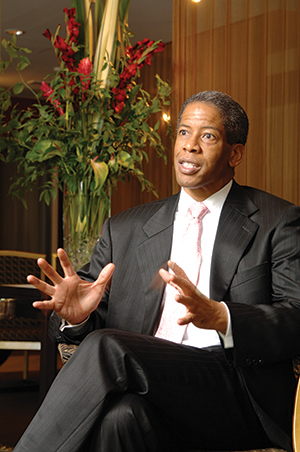 Lee’s refined approach and winning personality have made him one of the most networked business people in Japan. This profile didn’t go unnoticed by his peers, because in 2003 he became the first independent business owner to be elected President of the American Chamber of Commerce in Japan, an extremely prestigious office, especially for a self-made, non-Ivy League business person like Lee.
Lee’s refined approach and winning personality have made him one of the most networked business people in Japan. This profile didn’t go unnoticed by his peers, because in 2003 he became the first independent business owner to be elected President of the American Chamber of Commerce in Japan, an extremely prestigious office, especially for a self-made, non-Ivy League business person like Lee.
This maverick-meets-ambassador seems to come natural to Lee. “I like to be the one that goes against the stream, because even a dead fish can go with the flow,” said Lee. In that respect Lee is not entirely dissimilar to another recent “American President”—Barack Obama. The coincidence of becoming the Tokyo American Club’s first black President in the same year and month as America’s first black President is a fascinating historical twist that doesn’t go unnoticed by Lee, who despite his overall passion, tends to refrain from taking political sides when it comes to representing the club.
In recent years, Lee has focused more on his other business, IGC Japan Ltd., or “I Can Gymnastics” (www.igcjapan.com), a family business that he started back in 1980 that uses gymnastics to build confidence in young children throughout Japan. In building the family business Lee has made it a point to teach his sons, Lance, Lewis, Lonnie and Lucian, the value of being a mentor to young children, even though the Lee brothers are still relatively young in their own right. “Some of the best teachers are people who don’t do the sport they are teaching,” said Lee. “When I taught swimming, my team was dynamite because I didn’t do the laps. If I had done the laps I would have empathy and think ‘that is not easy!’ But when you’re watching someone else, I push you to your level, not mine. I’m a gymnast, I know what it feels like to have your Achilles muscle pulled. But if I didn’t, I’d push you a little further to find out what your level is. I have no empathy at all in that situation. That’s why some of your best coaches are people who haven’t done it (the sport) because they can’t relate. They’re looking at you based upon what you can do, not what they can do.”
Life coaching the young in Japan is one thing, but when it comes to American adults living in Japan, Lee offers stern words of advice. “[Americans] should always realize that they are just visiting,” said Lee. “This is not their country, they should respect the laws here and not become arrogant. They should appreciate the lifestyle that they are afforded in this country. Now everyone doesn’t come here with that same feeling. Many people want to get back to where they come from, and I would grant you that most people do. Hey, I’ve said many times if the Japanese asked me to leave tomorrow I would go without any love lost. But I think foreigners coming here from America should embrace the culture.”
Such a matter-of-fact attitude about being an expat in Japan has helped Lee thrive, but it belies the amazing world he presides over at the Tokyo American Club as President. From the on-site swimming pool, to the gourmet restaurants, to the in-house spa, racket ball court, basketball court, book and video library, as well as a several large meeting areas designed for children, teens and executive meetings, visiting the Tokyo American Club is like experiencing a slice of the very best the U.S. has to offer, right in the middle of Japan.
Amazingly, the current facility is just a temporary building as the club’s original location is being completely remade into a modern, luxury facility that would be the envy of most college universities and even the most well-heeled private clubs on Wall Street. Scheduled to open for members in 2010, the entire project cost is estimated to be around ¥18.4 billion (roughly $200 million).
With such a high pricetag, and membership fees that soar past $20,000 per year, one might wonder if such a club is even relevant to the average, less-than-wealthy American in Tokyo. “I think it’s something to aspire to of course, and most of the foreigners that are here, if they are with companies, they can afford the club,” said Lee. “I think this is a good time, considering the economic climate, to be a member of this club. It’s an investment that pays for itself ‘if’ you use the club when you’re here. Because just like anything, if you get and you don’t use it, what’s the point. Being a member here is about coming to the events, getting involved, and talking with people. That will make it valuable to you because it’s about who you meet. We have over 51 nationalities here and everyone basically joined for the same reason—the facilities we have here and the camaraderie you get from being a member here, it’s a natural fit.”
Just one year into his first 2-year term (Tokyo American Club Presidents can only serve two 2-year terms), Lee is glowingly optimistic about the future of the club and its members. “I’m looking forward to greater things happening as we continue to move forward and continue to maintain the atmosphere of the club which is very social and a place in which people can enjoy each others company. If I can do that, I will be happy.”
Story by Adario Strange
From J SELECT Magazine, October 2009

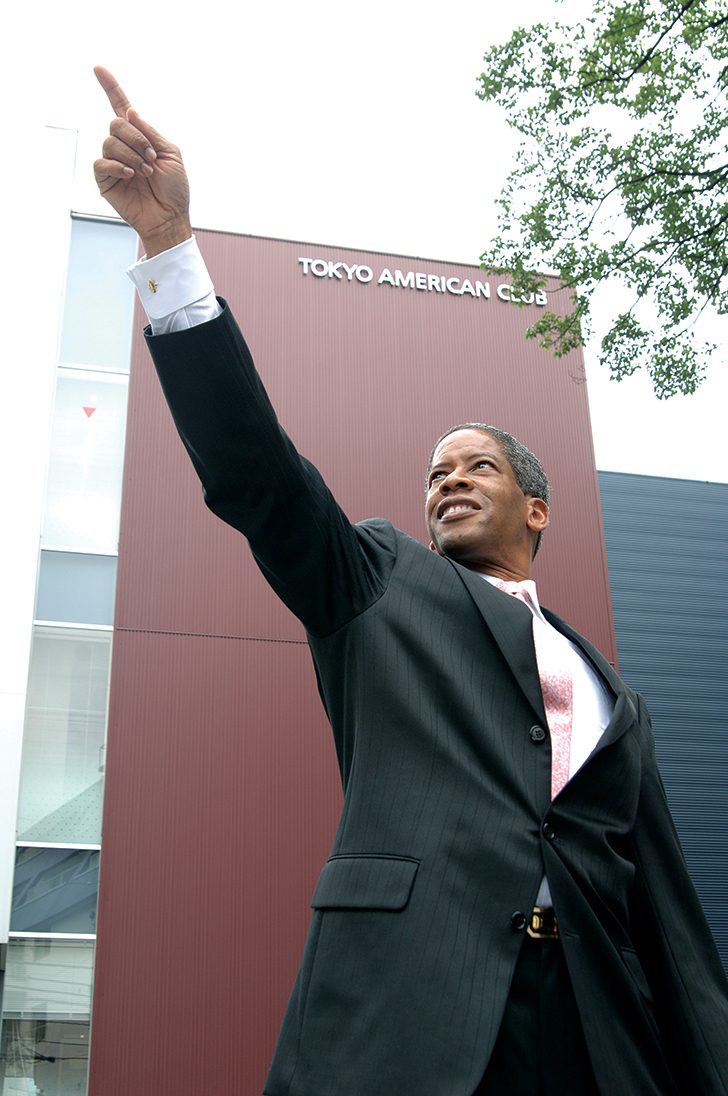

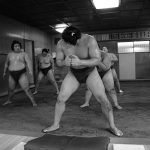

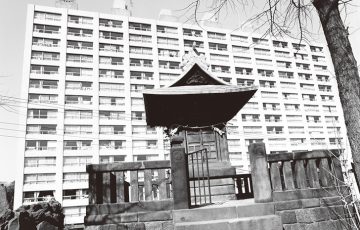
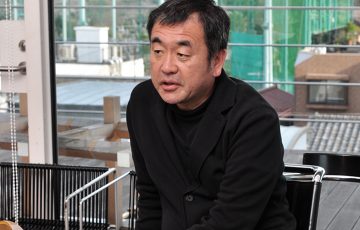

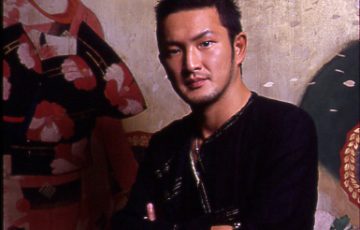



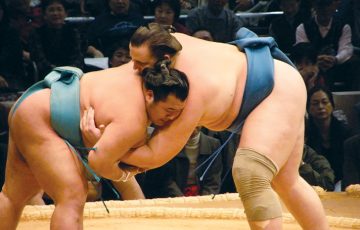


Recent Comments